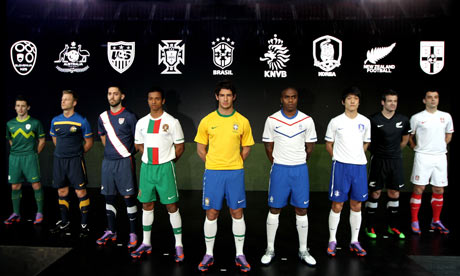
International players from each of the nine nations, sponsored by Nike, all wearing the 100% recycled shirts, pose at an event at Battersea power station in London this week. Illustration: Paul Gilham
When Kaka and Ronaldinho stride out onto the pitch for the World Cup in South Africa this summer, few of their millions of fans are likely to notice that their yellow jerseys are made from old plastic bottles.
But five-time winners Brazil, along with Portugal and the Netherlands, will for the first time be clad in shirts made from recycled polyester in a bid to make the tournament a fraction greener. The shirts, made by Nike, will also be worn at the finals by the teams of the USA, South Korea, Australia, New Zealand, Serbia, and Slovenia.
Fans supporting their country can buy away kits of the 100% recycled shirts from today, with home versions available from 1 May. They will cost £50, the same price as non-recycled shirts.
It takes up to eight recycled plastic bottles to make each of the shirts, which are sourced from Japanese and Taiwanese landfill and melted down before being processed into fabric. Nike claims the process cuts energy use by 30% compared with newly manufactured polyester.
The sportswear brand is not the first apparel firm to make clothes from old plastic. Sainsbury’s has previously sold skirts, trousers and shirts made from recycled plastic bags under its Tu brand, while M&S and BHS started stocking school uniforms made from recycled polyester in 2007. Clothing brands such as Howies and Patagonia have also sold recycled plastic garments for years.
The kits are also reportedly designed to keep players dry and cool at the World Cup this June and July.
The move was welcomed by the green fashion industry. A spokesperson for the Ethical Fashion Forum, an industry body that promotes sustainability, said the recycled shirts were “definitely a step in the right direction.” She added that Nike had taken huge steps in recent years to improve its record on worker rights.
Nina Stevenson, from the Centre for Sustainable Fashion at London College of Fashion, said the material in the shirts is a genuinely “green” choice by Nike. “Using recycled PET in performance wear is a recognised innovation with real environmental benefits. By using existing resources, Nike are supporting closed loop design that is not compromising ecological balance,” said Stevenson.
In a recent interview with the Guardian, Nike’s vice-president of sustainable business and innovation, Hannah Jones, said green initiatives such as the shirts made business sense for the company. “The link between sustainability and Nike as a growth company has never been clearer and there is a real business case to be made for making Nike a more sustainable company,” she said.
Jones also described carbon offsetting, which Nike ditched last year, as a “last resort”. And she argued that a decision last year by Nike to resign from the US Chamber of Commerce’s board over its stance on climate change, rather than pulling out entirely as companies such as Apple did, had enabled it to continue “a productive dialogue”. However, she admitted the chamber was yet to change its mind, which has seen the body campaigning against legislation to reduce greenhouse gas emissions in the US.
by Adam Vaughan. guardian.co.uk, Thursday 25 February 2010 18.13 GMT
[source: http://www.guardian.co.uk/environment/2010/feb/25/recycled-world-cup-football-shirts-brazil]